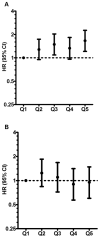Trans fat, aspirin, and ischemic stroke in postmenopausal women
- PMID: 22383309
- PMCID: PMC3371162
- DOI: 10.1002/ana.23555
Trans fat, aspirin, and ischemic stroke in postmenopausal women
Abstract
Objective: To examine the associations between dietary fat intake and ischemic stroke among postmenopausal women.
Methods: We conducted a prospective cohort study of 87,025 generally healthy postmenopausal women (age, 50-79 years) enrolled in the Women's Health Initiative Observational Study. Repeated and validated dietary assessments were done using a self-administered food frequency questionnaire. We used Cox proportional hazards models to estimate hazard ratios (HRs) of ischemic stroke based on quintiles of the cumulative average of fat intake.
Results: We documented 1,049 incident cases of ischemic stroke over 663,041 person-years of follow-up. Women in the highest quintile of trans fat intake had a significantly higher incidence of ischemic stroke (HR, 1.39; 95% confidence interval [CI], 1.08-1.79; p-trend = 0.048) compared with women in the lowest quintile, while controlling for multiple covariates. The observed association was modified by aspirin use (p-interaction = 0.02). The HR was 1.66 (95% CI, 1.21-2.36; p-trend < 0.01) among baseline non-aspirin users (n = 67,288) and 0.95 (95% CI, 0.60-1.48; p-trend = 0.43) among aspirin users (n = 19,736). No significant associations were found between intakes of saturated, monounsaturated, or polyunsaturated fat and ischemic stroke or any ischemic stroke subtypes.
Interpretation: In this large cohort of postmenopausal women, higher intake of trans fat was associated with incident ischemic stroke independent of major lifestyle/dietary factors. Aspirin use may attenuate the potential adverse effect of trans fat intake on ischemic stroke.
Copyright © 2012 American Neurological Association.
Figures

References
-
- Mozaffarian D, Aro A, Willett WC. Health effects of trans-fatty acids: experimental and observational evidence. Eur J Clin Nutr. 2009;63 (Suppl 2):S5–21. - PubMed
-
- Iso H, Stampfer MJ, Manson JE, et al. Prospective study of fat and protein intake and risk of intraparenchymal hemorrhage in women. Circulation. 2001;103:856–863. - PubMed
-
- He K, Xu Y, Van Horn L. The puzzle of dietary fat intake and risk of ischemic stroke: a brief review of epidemiologic data. J Am Diet Assoc. 2007;107:287–295. - PubMed
-
- Renaud SC. Diet and stroke. J Nutr Health Aging. 2001;5:167–172. - PubMed
Publication types
MeSH terms
Substances
Grants and funding
- N01WH32102/WH/WHI NIH HHS/United States
- R21NS056445/NS/NINDS NIH HHS/United States
- N01WH42132/WH/WHI NIH HHS/United States
- N01 WH022110/WH/WHI NIH HHS/United States
- N01WH32113/WH/WHI NIH HHS/United States
- N01WH32122/WH/WHI NIH HHS/United States
- N01WH32111/WH/WHI NIH HHS/United States
- N01WH42130/WH/WHI NIH HHS/United States
- N01WH32100/WH/WHI NIH HHS/United States
- N01WH24152/WH/WHI NIH HHS/United States
- N01WH32112/WH/WHI NIH HHS/United States
- N01WH32101/WH/WHI NIH HHS/United States
- N01WH32119/WH/WHI NIH HHS/United States
- N01WH32105/WH/WHI NIH HHS/United States
- N01WH32106/WH/WHI NIH HHS/United States
- N01WH42129/WH/WHI NIH HHS/United States
- R21 NS056445/NS/NINDS NIH HHS/United States
- N01WH42107-26/WH/WHI NIH HHS/United States
- N01WH32118/WH/WHI NIH HHS/United States
- N01WH42131/WH/WHI NIH HHS/United States
- N01WH32109/WH/WHI NIH HHS/United States
- N01WH32108/WH/WHI NIH HHS/United States
- N01WH32115/WH/WHI NIH HHS/United States
- N01WH44221/WH/WHI NIH HHS/United States
LinkOut - more resources
Full Text Sources
Medical

